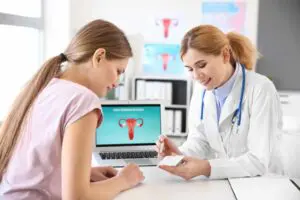Embarking on the journey of womanhood often involves a series of anticipated milestones, but what happens when nature takes an unexpected turn? Early menopause, a condition where a woman experiences the cessation of her menstrual cycle before the age of 40, can be a surprising and challenging aspect of reproductive health. In this blog, we will explore the intricacies of early menopause, shedding light on its causes, symptoms, and the emotional and physical toll it can take.
Contents
What Is The Earliest Age For Menopause?
 The average age for natural menopause is around 51 years old, but menopause can occur at various ages. The term “early menopause” typically refers to menopause occurring before the age of 40. However, the earliest age at which menopause can occur is during the late teens or early twenties, although such cases are extremely rare.
The average age for natural menopause is around 51 years old, but menopause can occur at various ages. The term “early menopause” typically refers to menopause occurring before the age of 40. However, the earliest age at which menopause can occur is during the late teens or early twenties, although such cases are extremely rare.
Menopause that occurs before the age of 40 is known as premature or early menopause. Various factors can contribute to early menopause. It’s essential for women experiencing symptoms of early menopause or who have concerns about their reproductive health to consult with a healthcare professional. Early menopause can have implications for fertility, bone health, and overall well-being, so appropriate medical guidance is crucial.
Can I Go Through Menopause At 28?
Yes, a woman can go through menopause at 28, but it’s relatively uncommon. The average age for natural menopause is around 51, so experiencing menopause at 28 would be considered early or premature.
Various factors can contribute to early menopause. If you’re experiencing symptoms of menopause at a younger age and are concerned about it, it’s important to consult with a healthcare professional. Early menopause can have implications for fertility, bone health, and overall well-being, so seeking appropriate medical guidance is crucial.
A healthcare provider can help assess your situation, perform necessary tests, and discuss potential treatment options or strategies for managing symptoms if needed. If you’re considering fertility preservation or have concerns about reproductive health, discussing these matters with your healthcare provider is especially important.
What Are Some Signs Of Early Menopause?
Experiencing signs of early menopause can be a concern. And it’s important to recognize these symptoms and seek medical advice. Consultation with a healthcare professional is crucial for a proper diagnosis. Here are some common signs of early menopause:
- Irregular Menstrual Cycles: Changes in the menstrual cycle, such as irregular periods or skipping periods, can be an early indication.
- Hot Flashes and Night Sweats: Sudden and intense feelings of heat, often accompanied by sweating, can be a classic symptom of hormonal changes associated with menopause.
- Vaginal Dryness: A decrease in estrogen levels can lead to vaginal dryness and discomfort during intercourse.
- Mood Swings and Emotional Changes: Hormonal fluctuations can affect mood, leading to irritability, anxiety, or feelings of sadness.
- Sleep Disturbances: Insomnia or disrupted sleep patterns, often associated with night sweats, can be a common symptom.
- Changes in Libido: A decline in estrogen levels may lead to changes in sexual desire or discomfort during intercourse.
- Fatigue: Feeling unusually tired or experiencing low energy levels can be a symptom.
- Changes in Skin and Hair: Decreased estrogen levels can impact the skin and hair, leading to dryness, thinning, or changes in texture.
- Difficulty Concentrating: Some women may experience difficulty focusing or memory lapses during hormonal changes.
- Changes in Breast Tissue: Hormonal fluctuations can result in changes in breast tissue, including tenderness or a decrease in breast fullness.
It’s important to note that the severity and combination of symptoms can vary among individuals. If you are experiencing these signs and are concerned about early menopause, it is advisable to schedule an appointment with a healthcare provider.
What Are Some Possible Causes?

Several factors can contribute to early menopause. While some causes are natural and may have a genetic component, others result from medical interventions or health conditions. Here are some possible causes of early menopause:
- Genetic Factors
A family history of early menopause can increase the likelihood of experiencing it. Genetic conditions, such as Fragile X syndrome, can also contribute.
- Autoimmune Diseases
Certain autoimmune disorders, such as rheumatoid arthritis and thyroid disorders (like autoimmune thyroiditis), may affect ovarian function and lead to early menopause.
- Chromosomal Abnormalities
Conditions such as Turner syndrome, where a female is born with only one X chromosome (instead of two), can result in premature ovarian failure.
- Medical Treatments
Some medical treatments, such as chemotherapy and radiation therapy for cancer, can damage the ovaries and cause early menopause.
- Surgical Interventions
Surgical removal of both ovaries (bilateral oophorectomy) for medical reasons can induce early menopause.
- Eating Disorders
Severe and prolonged malnutrition or eating disorders can disrupt hormonal balance and contribute to early menopause.
- Pelvic Surgery
Certain pelvic surgeries, especially those involving the removal of ovarian tissue, can impact ovarian function and lead to early menopause.
- Hormonal Disorders
Conditions such as polycystic ovary syndrome (PCOS) or primary ovarian insufficiency can affect hormonal regulation and contribute to early menopause.
- Smoking
Smoking has been linked to early menopause, possibly due to its impact on ovarian function.
- Chemical Exposures
Exposure to certain environmental toxins or chemicals may contribute to ovarian dysfunction and early menopause.
It’s important to note that some cases of early menopause may not have an identifiable cause. If you suspect you are experiencing early menopause or are concerned about changes in your menstrual cycle and related symptoms, it’s crucial to consult with a healthcare professional. They can conduct thorough assessments, perform necessary tests, and provide personalized guidance on managing the effects of early menopause.
How To Cope Up With Early Menopause?
 Coping with early menopause involves a combination of physical, emotional, and lifestyle strategies to manage symptoms and adapt to the changes in your body. Here are some suggestions to help you navigate this transition:
Coping with early menopause involves a combination of physical, emotional, and lifestyle strategies to manage symptoms and adapt to the changes in your body. Here are some suggestions to help you navigate this transition:
Educate Yourself
Understand the causes of early menopause and its potential impact on your health, fertility, and well-being. Knowledge empowers you to engage in informed discussions with healthcare professionals and make decisions that align with your goals.
Seek Support
Reach out to friends, family, or support groups who have experienced or are experiencing early menopause. Sharing your thoughts, feelings, and questions with a supportive community can provide a sense of validation and comfort.
Consult a Healthcare Professional
Regular check-ups with a healthcare provider are essential for monitoring your health during early menopause. Open communication about your symptoms allows your healthcare team to tailor a treatment plan that addresses your specific needs. Hormone replacement therapy (HRT) is one option to manage symptoms like hot flashes and vaginal dryness.
Embrace a Healthy Lifestyle
Adopting a nutritious diet with adequate calcium and vitamin D is crucial for bone health, which can be affected by early menopause. Regular exercise not only supports physical health but also helps manage stress, improve mood, and enhance sleep quality.
Manage Stress
Practice stress-reducing techniques such as mindfulness meditation, deep breathing exercises, or yoga. These activities can help regulate stress hormones, alleviate mood swings, and contribute to overall emotional well-being.
Maintain a Regular Sleep Schedule
Establish a consistent sleep routine, aiming for 7-9 hours of quality sleep each night. Sleep hygiene practices, such as creating a calming bedtime routine and maintaining a comfortable sleep environment, can improve sleep quality.
Address Vaginal Dryness
If you experience vaginal dryness, consider using water-based lubricants or moisturizers to enhance comfort during intercourse. Consult with your healthcare provider for additional options, including hormone-based therapies, to address this symptom.
Explore Fertility Options
If preserving fertility is a concern, consult with a reproductive specialist to discuss options such as egg freezing or other fertility preservation methods. Understanding available choices can provide reassurance and help you make decisions aligned with your goals.
Mind-Body Practices
Engage in mind-body practices like meditation, tai chi, or guided imagery. These activities promote relaxation, reduce stress, and enhance emotional well-being. Integrating these practices into your routine can contribute to a more positive mindset.
Therapy or Counseling
Consider therapy or counseling to address any emotional challenges associated with early menopause. A mental health professional can provide a safe space to explore and process feelings, develop coping strategies, and navigate this life transition.
Stay Informed About Treatment Options
Keep yourself informed about medical treatments and interventions for managing specific symptoms. Understanding available options empowers you to actively participate in your healthcare decisions and advocate for your well-being.
Celebrate Achievements
Take time to reflect on your accomplishments and strengths. Celebrate the positive aspects of your life and recognize the resilience you demonstrate in facing the challenges of early menopause. Focusing on the positive can contribute to a sense of empowerment and emotional well-being.
Remember that everyone’s experience with early menopause is unique. So it’s important to tailor these strategies to your individual needs and preferences. If you have specific concerns or questions, don’t hesitate to discuss them with your healthcare provider for personalized guidance and support.
Conclusion
In conclusion, navigating early menopause is a personal journey that involves understanding its causes, recognizing the signs, and embracing various coping strategies. Educating oneself about this phase, seeking support from friends and professionals, and maintaining a healthy lifestyle are key components. Consulting with healthcare providers for personalized guidance, exploring available treatment options, and addressing emotional well-being through therapy or counseling are crucial steps.
By staying informed, fostering a positive mindset, and celebrating personal achievements, individuals can empower themselves to adapt to the changes that come with early menopause. Remember, you’re not alone in this journey, and there is support available to help you thrive beyond the challenges of early menopause.
If you are facing menopause related issues, menopause treatment at HerMantra can help. Book your free trial online menopause treatment session now.


